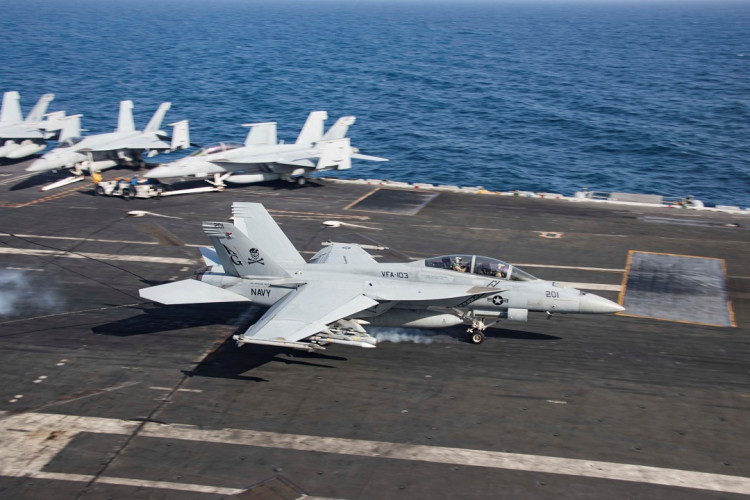Yemen's Houthi rebels have claimed responsibility for a missile attack on the U.S. aircraft carrier USS Dwight D. Eisenhower in the Red Sea. This move comes in response to recent U.S. and British military strikes on Houthi positions in Yemen. The attack marks a notable intensification in the conflict that has embroiled the region since 2015.
Houthi military spokesperson Yahya Saree announced the missile strike on Friday, linking it directly to the deadly assaults by the U.S. and the UK on Yemen's Hodeidah province. According to Saree, these retaliatory strikes resulted in the deaths of at least 16 people and injuries to 42 others, the highest publicly acknowledged casualty count from such operations.
The fallout from these strikes was detailed on Al Masirah television, a Houthi-controlled channel, which broadcast footage purportedly showing wounded civilians receiving treatment in Hodeidah. The Houthis have framed their actions as a defense mechanism, asserting their right to retaliate against what they describe as ongoing aggression by Western powers.
In a statement, U.S. Central Command (CENTCOM) confirmed that recent operations targeted 13 Houthi positions, successfully destroying eight uncrewed aerial vehicles in Houthi-controlled areas and over the Red Sea. The British Ministry of Defence also reported strikes conducted by Royal Air Force Typhoon FGR4s on facilities in Hodeidah and Ghulayfiqah, describing the targets as sites housing drone control facilities and storage for long-range drones and surface-to-air weapons.
May 30 U.S. Central Command Update
Between approximately 3:15 and 5 p.m. (Sanaa time) on May 30, U.S. Central Command (USCENTCOM) forces successfully destroyed eight uncrewed aerial vehicles (UAV) in Iranian-backed Houthi controlled areas of Yemen and over the Red Sea.… pic.twitter.com/uxtPyVecpU — U.S. Central Command (@CENTCOM) May 30, 2024
British Prime Minister Rishi Sunak defended the military actions, calling them a form of "self-defense in the face of an ongoing threat that the Houthis pose." Despite these assertions, the Houthis remain undeterred, continuing their military operations and maintaining their support for Palestinians amid the ongoing conflict between Israel and Hamas.
The Houthis, an Iran-aligned group controlling much of Yemen, have been a vocal supporter of Palestinians during Israel's war on Gaza. Their actions have included numerous drone and missile attacks on shipping in the Red Sea, Bab al-Mandeb strait, and the Gulf of Aden since November. These assaults have disrupted vital shipping routes, prompting the U.S. and UK to launch retaliatory strikes aimed at degrading the Houthis' capabilities.
The Iranian government has condemned the U.S. and British strikes, calling them violations of Yemen's sovereignty and international law. Iranian foreign ministry spokesperson Nasser Kanaani stated, "The aggressor U.S. and British governments are responsible for the consequences of these crimes against the Yemeni people."
The U.S. Maritime Administration has reported over 50 Houthi attacks on shipping, resulting in the deaths of three sailors, the seizure of one vessel, and the sinking of another. These ongoing hostilities have led shipping firms to reroute their cargo away from the Red Sea, opting for longer and more expensive journeys around Southern Africa.
Despite the retaliatory efforts by the U.S. and UK, the Houthis have shown resilience. They recently claimed responsibility for an attack on a Greek-owned bulk carrier and several other vessels in retaliation for Israeli strikes on Gaza. This persistent threat underscores the complexities of securing international shipping lanes and the broader geopolitical implications of the conflict.
The situation remains volatile, with both sides continuing to engage in a cycle of attacks and retaliations. The international community watches closely as these developments unfold, aware of the broader implications for regional stability and global trade routes.





